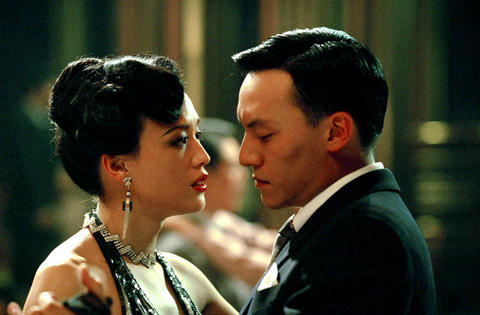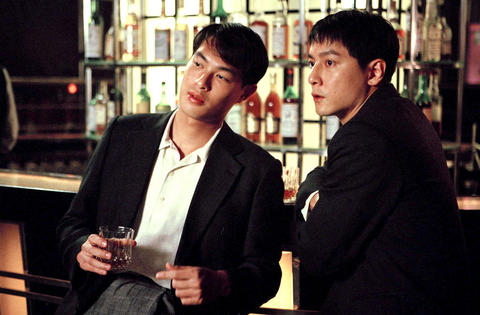Selected to close the 64th Venice Film Festival, which runs from Aug. 29 to Sept. 8, the highly anticipated gangster flick Blood Brothers (天堂口) boasts a cast comprising some of Asia's A-list stars, including Daniel Wu (吳彥祖), Shu Qi (舒淇) and Zhang Zhen (張震). Surprisingly, the blockbuster-to-be is Philippines-born, London- and New York-educated Alexi Tan's (陳奕利) directorial debut. The fashion photographer and music video director was spotted by John Woo (吳宇森), one of the film's producers.
With the blessing of Hong Kong's doyen of gangster/action cinema, Tan set out to create what he believes is a work informed by both Eastern and Western influences and a tribute to Woo's 1990 epic Bullet in the Head (喋血街頭), emulating the world-class director's signature style, - a blend of violence and romanticism.
Set in Shanghai during the 1930s, the film begins with three close friends, Fung (Daniel Wu, 吳彥祖), Kang (Liu Ye, 劉燁) and Xiaohu (Tony Yang, 楊祐寧), Kang's little brother, living in a small village on the outskirts of Shanghai.

PHOTOS: COURTESY OF 20TH CENTURY FOX TAIWAN
To escape their poverty-stricken lives as fishermen, the three decide to try their luck in the big smoke and are soon drawn into the criminal underworld led by Boss Hong, a film producer and the owner of Paradise Club, Shanghai's most infamous nightclub, where danger and bloodshed are masked in seductive disguises.
A sultry object of all the men's desires, resident singer Lulu (Shu Qi) dreams of stardom but sets off an unfortunate chain of events when Boss Hong uncovers the secret affair she is conducting with his right-hand man Mark (Zhang). Meanwhile, both Hong's enemies and allies plot to seize control of the underworld group.
As the three friends rise to power, Fung is caught in a quandary, undecided on which way to go: He must choose between the world of violence and an unrequited love or return to the man he once was. The most innocent of the three, Xiaohu has his own weakness and is afraid to stand up for himself while Kang ruthlessly jostles for power.

By the end, innocence and lives are lost, but hope springs eternal.


June 2 to June 8 Taiwan’s woodcutters believe that if they see even one speck of red in their cooked rice, no matter how small, an accident is going to happen. Peng Chin-tian (彭錦田) swears that this has proven to be true at every stop during his decades-long career in the logging industry. Along with mining, timber harvesting was once considered the most dangerous profession in Taiwan. Not only were mishaps common during all stages of processing, it was difficult to transport the injured to get medical treatment. Many died during the arduous journey. Peng recounts some of his accidents in

“Why does Taiwan identity decline?”a group of researchers lead by University of Nevada political scientist Austin Wang (王宏恩) asked in a recent paper. After all, it is not difficult to explain the rise in Taiwanese identity after the early 1990s. But no model predicted its decline during the 2016-2018 period, they say. After testing various alternative explanations, Wang et al argue that the fall-off in Taiwanese identity during that period is related to voter hedging based on the performance of the Democratic Progressive Party (DPP). Since the DPP is perceived as the guardian of Taiwan identity, when it performs well,

A short walk beneath the dense Amazon canopy, the forest abruptly opens up. Fallen logs are rotting, the trees grow sparser and the temperature rises in places sunlight hits the ground. This is what 24 years of severe drought looks like in the world’s largest rainforest. But this patch of degraded forest, about the size of a soccer field, is a scientific experiment. Launched in 2000 by Brazilian and British scientists, Esecaflor — short for “Forest Drought Study Project” in Portuguese — set out to simulate a future in which the changing climate could deplete the Amazon of rainfall. It is

The Taiwan People’s Party (TPP) on May 18 held a rally in Taichung to mark the anniversary of President William Lai’s (賴清德) inauguration on May 20. The title of the rally could be loosely translated to “May 18 recall fraudulent goods” (518退貨ㄌㄨㄚˋ!). Unlike in English, where the terms are the same, “recall” (退貨) in this context refers to product recalls due to damaged, defective or fraudulent merchandise, not the political recalls (罷免) currently dominating the headlines. I attended the rally to determine if the impression was correct that the TPP under party Chairman Huang Kuo-Chang (黃國昌) had little of a